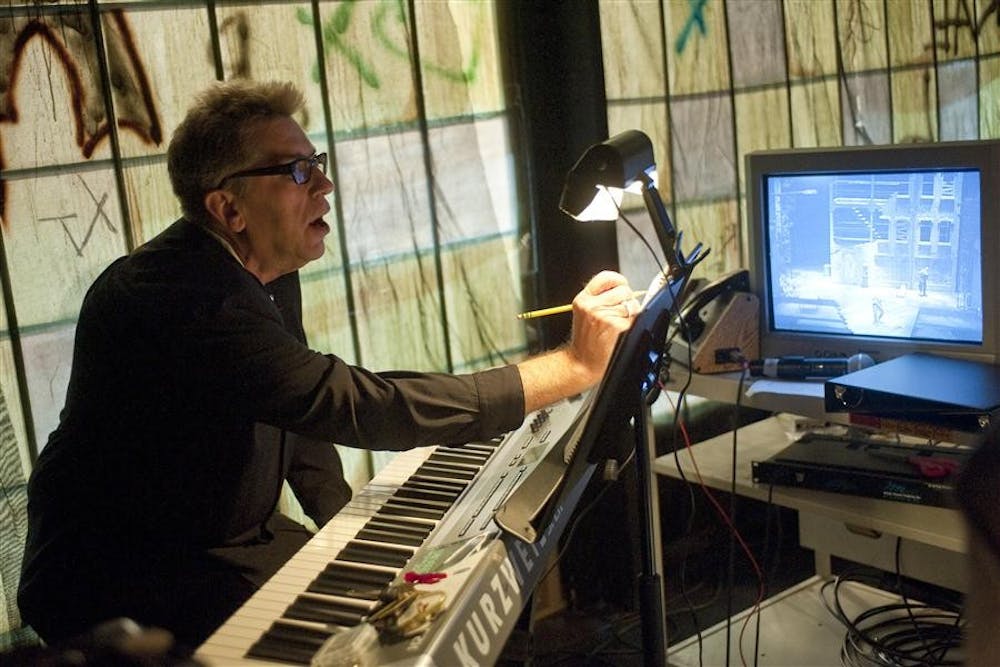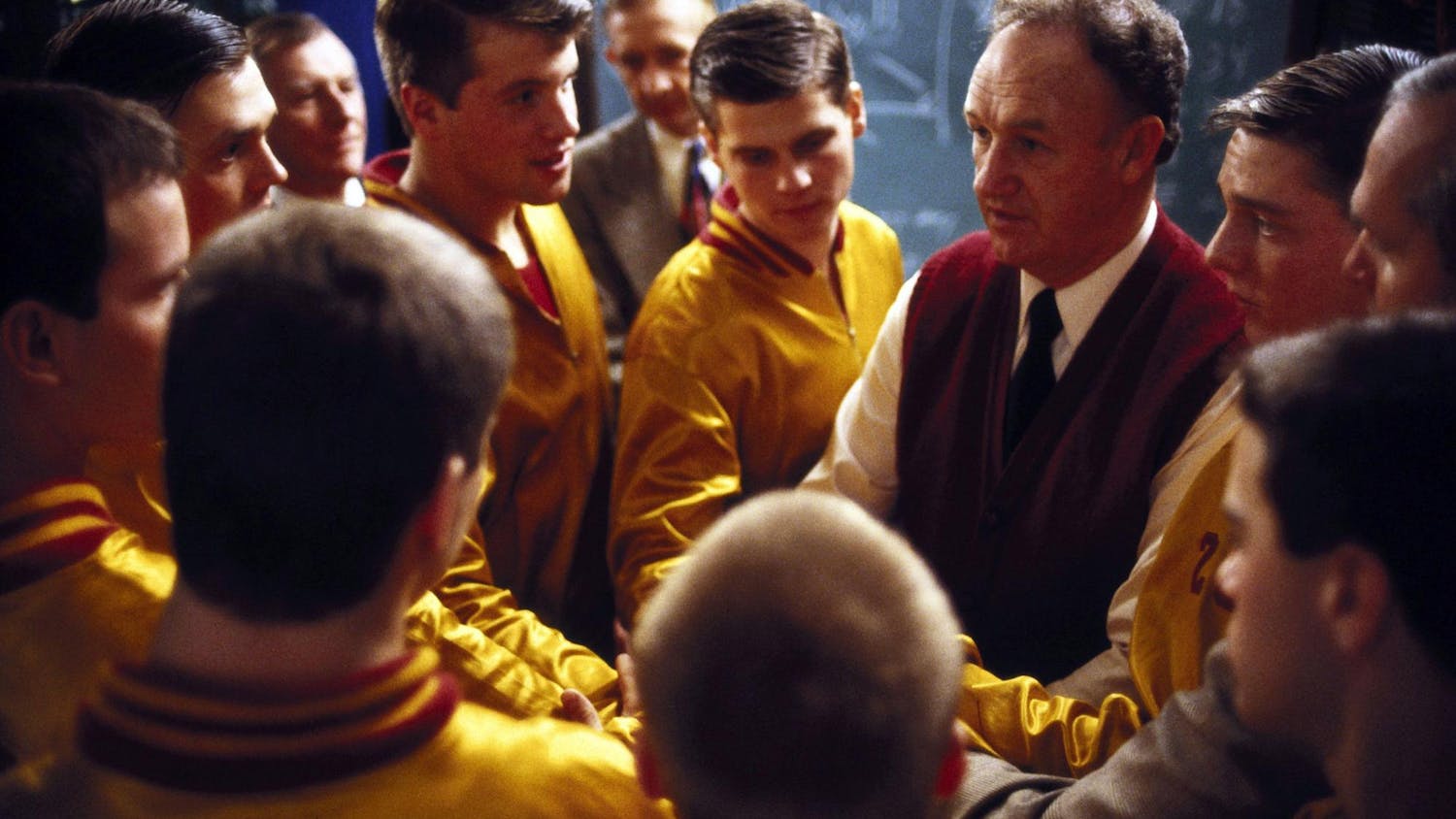Terry LaBolt stood in a rehearsal room surrounded by the cast and crew of “Rent,” struggling to find the right words.
The musical director for IU’s Department of Theatre and Drama had known this moment was coming for a few months now, ever since the department chose the show as the season opener, but that didn’t make it easy.
No matter how many times he did this, it was never easy.
As LaBolt searched for a way to begin, his eye caught a model version of the set. It was simple: a brick wall, the façade of an apartment building in 1980s Alphabet City, N.Y., now known as the Lower East Side. Parts of the wall had fallen away, decayed and worn.
As he took in the set, the memories flooded in with unexpected force.
He had lived in Alphabet City in the 1980s. He walked the streets of the theater district lined with people asking for $2 — the price of one crack hit. He watched his friends physically change before his eyes — growing thinner, paler, weaker — as they fought the battles for their lives. Battles they would eventually lose, overcome by blindness, pneumonia or cancer.
He was prepared to tell his story, but not for the wave of emotion that hit him so suddenly. He looked down at the set model, a recreation of a place and time that defined his life. As he wrestled with the memories that were still fresh after 25 years, he started the only way he could.
“I was there.”
*****
LaBolt was diagnosed with HIV in 1986. He knew he was at risk, but he didn’t suspect the news until taking an anonymous test.
“That’s all very interesting to some people,” LaBolt said in reference to his infection and diagnosis. “But to me, it’s just what happened.”
What “happened” would transform LaBolt’s life.
He disclosed his status to a select few people, excluding coworkers and his music students. Life was a flux of ups and downs, drug combinations and diet reforms.
LaBolt survived an onslaught of complications, but by 1996 he was too sick to teach.
He was weak, his skin sallow. Tests revealed a tumor forming on his already failing liver.
Doctors suggested a liver transplant. But despite his obvious need, doctors were clear on two things: He wouldn’t be eligible as an AIDS patient, and he had two years to live.
While LaBolt’s health was waning, a musical by composer Jonathan Larson was turning heads. “Rent” opened in an off-Broadway theater on Jan. 25, 1996. Riding the wave of success, the tour came to Cincinnati that year where LaBolt had moved to teach at the University of Cincinnati.
When the show opened, LaBolt watched the scenes of Alphabet City in the 1980s unfold. The drugs and impoverished artists were an all too familiar sight. But they were also a sight of a previous decade, a preservation of the old way of thinking that permeated the ’80s under the shadow of HIV/AIDS.
“They just prayed for a miracle and were nice to you,” LaBolt said of the nurses and physicians in the ’80s.
But that changed in 1996 with the advent of antiretroviral drugs and the revolutionary drug “cocktail.”
“The former nurses had to find some other hopeless people to work with,” he said.
When he first heard the now iconic songs played out on stage, pushing his memories back to 1986, LaBolt was overcome with a feeling of annoyance. People were finally feeling good about new meds and feeling hope for the future for the first time.
“The hopelessness of the ‘Rent’ characters seemed out of place,” he said. “I didn’t want others with AIDS to have that hopeless feeling. Therefore, ‘Rent’ was not an experience I felt they, or I, should dwell in.”
And so he avoided the show for more than a decade. For one thing, rock wasn’t his style. And while he could appreciate the show and its music, he couldn’t move past the topic. His grief for friends he lost and his own problems was still too raw.
*****
In 2003, LaBolt was one of a handful of HIV patients nationwide to receive a liver transplant. He was slated as the first person in a five-year study to undergo the procedure. Twenty-four hours after the study launched, he was in surgery.
“I was in really bad shape, and when I woke up, it was like I was 20 years younger,” he said.
The combination of his renewed health and an opening in IU’s musical theater program for a musical director had LaBolt considering a return to teaching. Before the interview with IU, he spoke with legal counsel who assured him he had no obligation to inform the search committee of his status. He prepared a statement, but decided to wait until meeting the committee before choosing whether or not to share his status.
During the interview, he felt a connection with the people around him. He now felt they were deserving of the information. And he told them he had HIV.
The room grew very quiet, LaBolt recalled. No one knew how to react, including him.
“I don’t know if it’s a good or a bad thing that I’m telling you this,” he remembered saying.
As a person who has disclosed his status countless times during the last quarter of a century, he’s learned that there is never a magical moment. There’s no formula for when or how to disclose.
But the uncertainty of his decision didn’t last long. LaBolt was offered the musical director position shortly after.
*****
As the department planned for 2010, “Rent” emerged as the main choice to start the season. For LaBolt, it meant working on a show he had managed to avoid for so many years. But when the idea was proposed, he decided that now was the right time to do it.
LaBolt discussed with director George Pinney how he would talk about HIV and witnessing the real Alphabet City. The two planned the night as if preparing for a class.
Pinney had just posted the cast list that day, and the students buzzed with excitement as they filed in for their first meeting, senior Gina Ricci recalled.
They listened as designers showed them concepts for the set, costumes and lights.
Then LaBolt stepped forward.
Many of the cast were already aware of LaBolt’s status, but had never heard the emotion and details behind it all.
And so LaBolt told them what it was like to see those he loved get sick and die. Mostly, he told them about the people. People who stopped showing up to work and school, and no one would go looking for them. People who abandoned their partners when they got sick. People who died alone.
The students tried to grasp the reality LaBolt presented them. Some had tears in their eyes. Most had no idea how to react.
“I looked around the room at my friends, the family that I’ve become a part of here, and tried to imagine watching them waste away and die,” senior William Angulo said. “Not really understanding what they were sick with, having their friends and family cast them aside out of shame. It’s almost too difficult to do.”
All they could do was listen as LaBolt told stories of watching his friends suffer, describing this contemporary leprosy where people were too scared to touch the people they loved.
“His story gave our cast a sort of a mission mentality, if you will,” Angulo said. “We knew exactly what our piece was about and exactly what work we had to do. Every rehearsal had that undertone that we were contributing to something that was greater than ourselves."
LaBolt knew that night would be emotional, but he expected it to build — working its way out, growing as the details reorganized and settled in the students’ minds. But the moment of raw emotion that seized LaBolt set the tone from the beginning. He cried, and the cast cried with him.
*****
This piece of musical fiction was LaBolt’s reality.
The cast began to view characters such as Mark, Roger and Mimi as more than creations from the writer’s mind.
Mark’s role as the survivor who has no control over his friends’ suffering was LaBolt’s constant struggle. Though he was infected when he lived in New York, he wasn’t diagnosed until he had already left.
He was the one who had to stand by helplessly as friends died, some taking their own lives rather than going through the tortuous journey.
When Roger runs away in the play, unable to watch Mimi die, LaBolt remembers moving to Ohio, separating himself from the grief in Alphabet City. He remembers wanting to get away from the sick people and hide from his life.
“The cast really had a connection to that because they felt they were speaking for me,” he said.
For the students in “Rent,” Larson’s lyrics aren’t a distant concept but LaBolt’s history. Those scenes are grounded in more than a script and preconceptions.
“Every time I felt a block or was thinking too much, Terry would let me know about a point in his life,” Ricci said. “He helped us immensely throughout the creative process. There were so many levels to every character that, without Terry, would never be stripped away.”
*****
LaBolt’s feelings of annoyance and avoidance toward “Rent” have passed.
It is a different time and he has a different attitude, largely attributed to his transplant and improved health.
He knew for his students to understand the piece, to portray it in the truest sense they could, he had to share his experience.
“I love having my students experience this part of my life, and I hate it at the same time,” he said. “Part of me doesn’t want anyone to have to know about this. But another part of me knows it is important for all of us, and I allow it all to happen.”
The characters on stage carry accuracies within them. Moments of truth are apparent in the world they create. And now, decades after the 1980s Alphabet City, LaBolt said he believes it is important for people to remember and understand the history of the AIDS epidemic.
“It’s even more important to me now than it was then,” he said. “It’s no longer a death sentence, but it’s still a life sentence.”
LaBolt will be there behind the stage as the curtain rises. As a cast of students share a story of love and anger and AIDS in 1980s New York, LaBolt will remember. He will allow the memories of friends and loved ones to rise to the surface.
And when the emotions get to be too much, he will let the music tell the story.
'Rent' cast draws inspiration from conductor’s experiences living with AIDS

Get stories like this in your inbox
Subscribe





